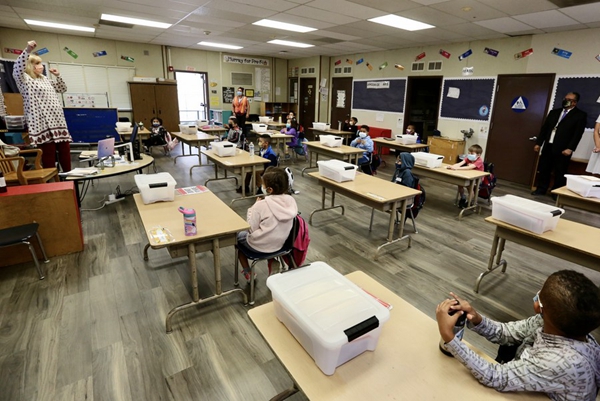
Students attend an in-person class in a school in Los Angeles, California, the United States, on April 13, 2021. [Photo/Xinhua]
Global cases of the novel coronavirus continued to increase for a seventh consecutive week, with over 4.5 million new cases reported last week, the World Health Organization (WHO) reported early Wednesday on its weekly update.
The number of new deaths increased for the fourth consecutive week, increasing by seven percent compared to last week, with over 76,000 new deaths reported, according to the WHO.
The outbreak was especially violent in India as the country reported 873,296 new cases, an increase of 70 percent compared to last week. It also saw the number of new deaths growing by 51 percent. The United States came the second with a five percent increase of 468,395 new cases; and Brazil listed the third with a rise of 463,092 new cases.
In terms of global COVID-19 new deaths, the South-Asia, Southeast Asia and Western Pacific region saw sharp surges with the Western Pacific displaying an increase of 189 percent in number, the Philippines leading with the grim record of 1,321 new deaths, 400 percent more than last week.
Furthermore, new virus variants continue to spread to other countries, with the variant B117 first identified in the UK reported in 132 countries, the variant B 1351 originating from South Africa present in 82 countries, and the P1 first identified in Brazil now established in 52 countries.
The WHO also noted that existing vaccines have displayed reduced efficacy against variants, even if the related studies remained limited in number.
As an example, the AstraZeneca vaccine saw reduction in post-vaccine neutralization for variant B117, while it saw "substantial reduction" for the variant originating from South Africa.
Studies also reported "evidence of more substantial reduction" in post-vaccine neutralization of the variant first found in Brazil for AstraZeneca, Moderna and Pfizer-BioNTech vaccines.
Earlier this week, the WHO stressed that measures such as wearing masks and hand hygiene were still important as "we are in a critical point of the pandemic right now."




